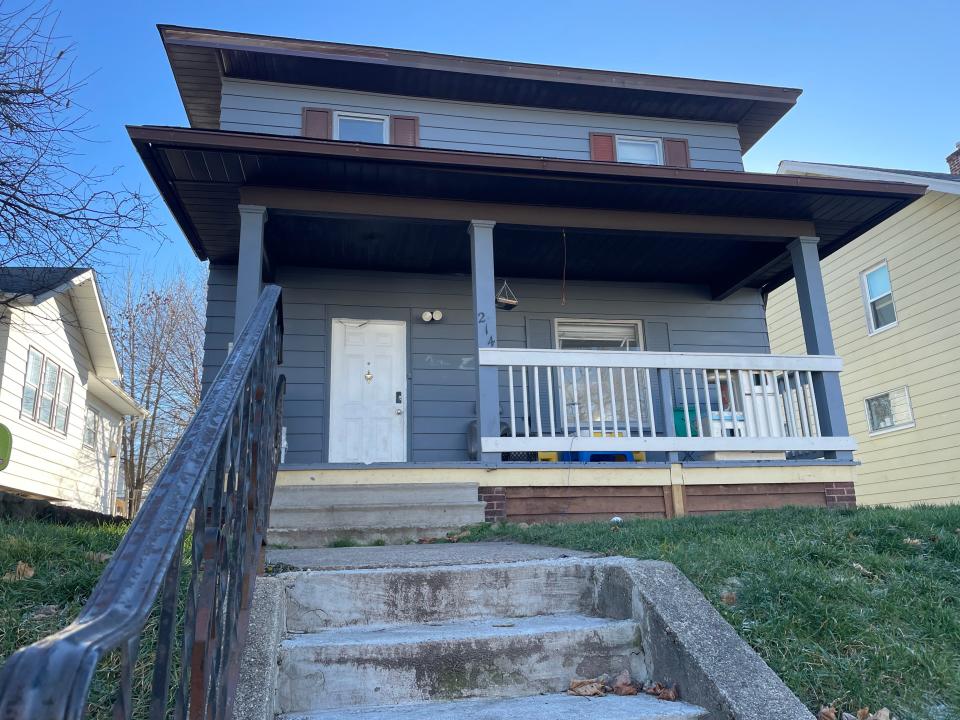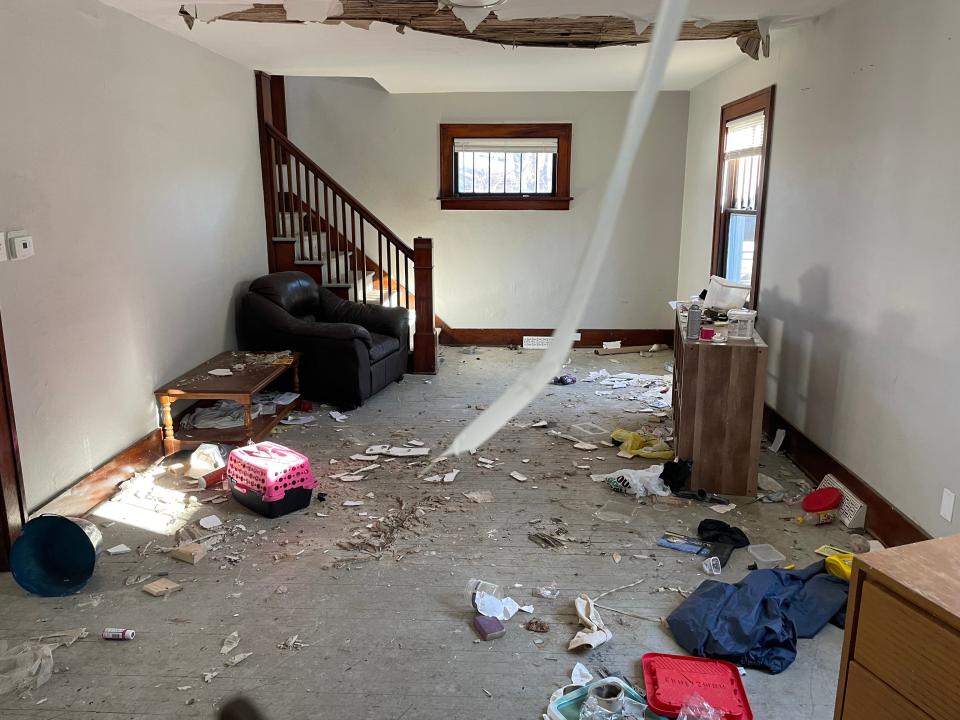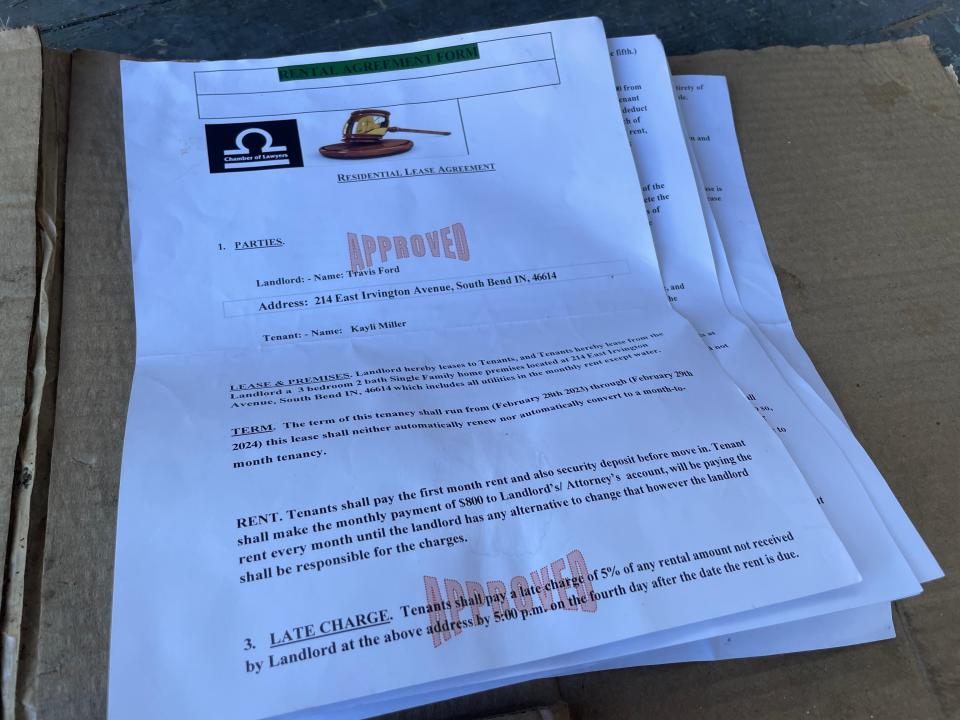With South Bend family evicted after scam, some question their property owner's practices

SOUTH BEND — At the start of this year, Kayli Miller and her husband, Aaron Smith, moved into a house on the southeast side that seemed almost impossibly ideal.
The couple had longed to raise their four children somewhere other than the long-troubled Miami Hills Apartments, a public housing complex for low-income renters. The family lived there until February, when Kayli found what seemed like an escape hatch: a Facebook listing for a newly remodeled two-story home at 214 E. Irvington Ave.
The proposed rent of just $800 a month seemed hard to beat. Miller reached out to a man who had made the listing under the name Travis Ford. He provided a code to a lockbox on the door so the couple could let themselves in and tour the space. They signed a digital lease that same day, sending the man $1,600 to cover the first month's rent and a security deposit.
Better Business Bureau: Rental scams prey on overwhelmed movers
Days before this Christmas, however, the couple and their five children — including a daughter born in late September — found themselves living in a spare room at a friend's house, jammed together in only two beds. They're paying to keep nearly everything they own in storage. Christmas presents for the kids are a fantasy.
Over the course of multiple eviction hearings this year, the family learned that they'd fallen victim to an unusual housing scam and would be forced to leave their new home at the end of November by the property's rightful owner, a New York-based real estate investment firm using variations of the name SFR3.

Travis Ford, according to St. Joseph County Judge Eric Tamashasky, appears to be a "charlatan." He somehow obtained the code to the lockbox and posed on Facebook as the property's rightful owner. Then he stopped answering the family's calls and messages.
“You became the victim of somebody from Facebook who rented a place they didn’t have the right to rent," Tamashasky told Miller during an Oct. 30 eviction hearing. SFR3 "became the victim of this person from Facebook because now they’ve got a person who they didn’t rent to in their rental.”
Advocates say owner bears some responsibility
According to local tenants' rights advocates and news reports from other cities, the family isn't alone.
Several other St. Joseph County tenants in SFR3's properties have noted a similar pattern, advocates say. The South Bend Housing Authority began alerting tenants to a scam, said Lori Wallace, who manages the Housing Choice Voucher program. And more than two dozen of SFR3's many eviction filings in St. Joseph County this year listed "unknown occupants" as the defendant, which typically signaled that someone might be unlawfully living in the home.
Advocates dispute the judge's notion that SFR3, which owns about 250 homes in St. Joseph County, bears no responsibility for allowing the scam to occur under its watch.
Indiana law requires landlords to employ a property manager and a registered business agent who is actually in Indiana. SFR3's main property manager, American Avenue Property Management, is headquartered in New York.
But the Indiana Secretary of State's business registry shows that American Avenue meets the in-state requirement by paying an annual fee to a firm called Indiana Registered Agent. The firm's stated purpose is to allow out-of-state businesses to operate in Indiana by registering at its Fort Wayne office.
During eviction hearings, a representative from American Avenue always appeared via telephone on behalf of the landlord. Most local property managers show up in person, often with an attorney, to make their case.
The firm's local attorney, Bruce Huntington, made clear that he had not visited the properties before filing to evict the tenants.
Representatives from American Avenue and SFR3 are "not in the state. They’re not really on the ground talking with whoever’s there. They’re not talking with their attorney in person in any way," said Katherine Wines, a legal navigator for Pro Bono Indiana who has watched hundreds of eviction hearings this year. "I feel like their knowledge is kind of abstract.”

Darwin Homes, the firm SFR3 originally hired to manage properties like the house on Irvington, followed a similar arrangement. Though it's headquartered in Texas, Darwin lists its registered business agent as Vcorp LLC, a firm that holds an Indianapolis address.
SFR3 parted ways with Darwin Homes this spring. A similar scam involving both companies was reported this February by the Kansas City Star, and tenants in Peoria, Ill., were outraged to have received notices to vacate from Darwin late last year.
The scam seems directly related to Darwin's policy of allowing prospective tenants to tour properties on their own using a one-time access code. Though the company boasts that this practice speeds up its turnover of rentals, it may also allow scammers to pose as renters, obtain an access code and post a fraudulent rental listing online in search of desperate victims.
“I do think the company bears some responsibility for this," said Judy Fox, a retired Notre Dame Law School professor who spent much of her career defending tenants' rights. "They might say, 'Oh, we had nothing to do with it.' But it's their negligence that's causing it to happen.”
Fox continued: “You basically opened the candy store and said to the bad guys: 'Oh, don't eat any of the candy.' I mean, it was just too easy."
SFR3 owns thousands of homes nationwide
Darwin Homes did not return an emailed request for comment sent last week, and a representative reached by phone said he couldn't connect a reporter with company leaders.
Reached by phone, Joanna DeLong, director of product operations for SFR3, told The Tribune: "Unfortunately, we just have a company policy of we don’t talk to reporters.”
The Tribune this week sent a detailed request for comment to Huntington, the company's South Bend-based attorney, about its leasing practices and its opinion as to whether it bears responsibility for allowing the scam to happen.
Huntington said in an email that the companies decline to comment. He defended American Avenue for its practice of waiving damages hearings after evicting tenants, which means tenants don't owe the property manager any money and can work with groups like the Volunteer Lawyer Network to seal their evictions.
Tamashasky, the judge in Miller and Smith's case, said he shared Huntington's belief that the landlord was generous to waive tenants' damages hearings.
Fox said she's concerned about large, out-of-state companies like SFR3 buying up swaths of cheap homes in communities like South Bend.
The company brands itself as a "boutique real estate investment fund," with plans to acquire $2.5 billion of single-family homes by 2024. It owns more than 11,000 homes in more than two dozen metros, according to its website, and it specializes in renovating dilapidated homes.
But Fox said she's learned of habitability issues across the state as a result of landlords who simply aren't around.

Smith and Miller say that crews came to mow the grass and fix the air conditioning while their family was living at the home. But the couple said the workers weren't even sure of the landlord's name.
Family reels after eviction
Once eviction proceedings began, Miller said, she tried to negotiate with the rightful owner to form a legitimate lease for $1,350 a month, the determined market rate.
“I tried to say I would stay and pay the rent, but they don’t want to process me in the house," Miller told The Tribune. "And they never even came by to see the house or nothing.”
Reached by phone last week while he watched after his newborn girl in the cramped bedroom, Smith said he's trying to be grateful where he can.
Yes, he may have been laid off from his job this fall. But at least he doesn't have to pay hundreds of dollars a week for his family to stay in a hotel room, he says.
At least they aren't outside on the street or split up in different homeless shelters.
At least three of his kids go to school for a reprieve from reality at home. At least his oldest child is only 9, meaning none of them, thanks to their youth, fully comprehend their family's crisis.
Raised on the south side of Chicago, Smith said he's used to finding ways to survive. He was kicked out of his house as a teenager. He's slept in hallways and cars and abandoned homes.
"I've been homeless before," Smith said. "But now I have kids, and so it's a little more on the brain than just having to worry about yourself.
"You have little bodies that you’ve gotta worry about.”
Tips for avoiding online rental scams
If you spot a scam, whether you've lost money or not, report it to the Indiana Attorney General's office at https://www.in.gov/attorneygeneral/consumer-protection-division/. You can also report it to the Better Business Bureau's Scam Tracker at bbb.org/scamtracker. Your story could help others avoid similar scams.
Here are recommendations from the Federal Trade Commission and local experts on how to avoid online rental scams:
Do some research. Search online for the management company's name plus words like "review," "complaint," or "scam." Bad reviews may be a sign to look elsewhere.
Verify who and what. Call the number on the management company's website — not the one in the listing — to ensure the listing agent actually works there. Check to see whether the company lists the home on its website.
Learn who owns the property. By entering a property address into the Michiana Area Council of Governments' property viewer, you can verify who owns any property in St. Joseph and Elkhart counties. Make sure any property manager or listed agent is working on behalf of the rightful owner.
Visit the rental unit in person. Make sure the space is available as advertised. Ask the listing agent for a guided in-person tour.
Pay by credit card. Scammers often will insist that you pay with cash or through payment apps like CashApp, Venmo or Zelle. All of these methods make it unlikely you'll get your money back. If the landlord insists you pay a fee or deposit before they show you the place, keep looking.
Email South Bend Tribune city reporter Jordan Smith at JTsmith@gannett.com. Follow him on X: @jordantsmith09
This article originally appeared on South Bend Tribune: Rental scams in South Bend linked to out-of-state company SFR3

